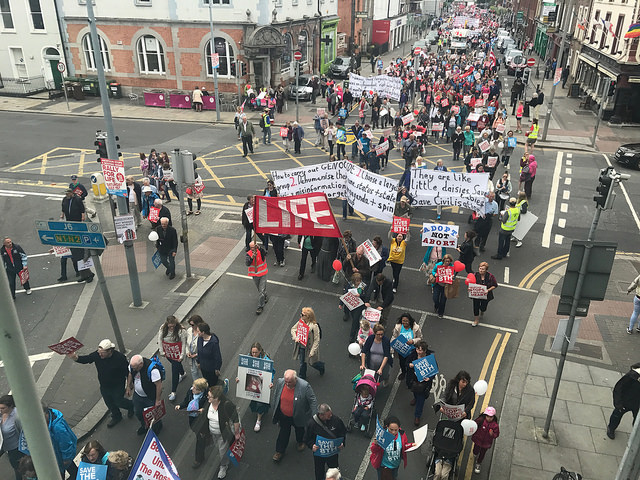Irish pro-choice advocates have a peculiar fear of the word “disability”. The Citizens’ Assembly ballots avoided the term entirely, preferring the cumbersome “significant foetal abnormality that is not likely to result in death before or shortly after birth”. In a 2015 letter to the Irish Times, the Executive Director of Amnesty Ireland Colm O’Gorman denied that there has “been a demand for abortion access … on the basis of disability of any sort propelling the call for reform of Ireland’s abortion law”.
It is interesting, then, to note the muted response to a report from the UN Committee on the Rights of Persons with Disabilities. While the committee’s searing criticisms of the UK’s progress in disability rights have made headlines, none have as yet mentioned what is arguably the report’s most controversial aspect, which relates to UK policy on disability-selective abortion:
“The committee is concerned about perceptions in society stigmatizing persons with disabilities as living a life of less value and the termination of pregnancy at any stage on the basis of foetal impairment. The committee recommends that the State party changes abortion law accordingly. Women’s rights to reproductive and sexual autonomy should be respected without legalizing selective abortions on ground of foetus deficiency.”
Women’s rights to reproductive and sexual autonomy should be respected without legalizing selective abortions on ground of foetus deficiency
This is neither a new nor unexpected development. The UK is merely the latest entrant on a list containing Austria, Hungary and Spain, all of whom the committee have recommended reforms of conditions that allow for later-term limits in abortions related to disability.
The 1967 UK Abortion Act prohibits most abortions after a gestational age of 24 weeks. Section 1(1)(d) of the act, however, provides that where the child would be “seriously handicapped” (what official UK abortion parlance terms “Ground E”), this limit does not apply. Abortions can, theoretically, take place up to birth.
In 2016, there were 3,208 abortions Ground E abortions in the UK, comprising about two per cent of the overall abortion figure. Two hundred and twenty five of these abortions happened at 24 weeks and over – over the limit for children without disabilities. Between 1995 and 2016, there has been a 263 per cent increase in Ground E abortions taking place after 24 weeks.
In their 2016 abortion report, the NHS warns that these figures “should be treated with caution”, as “it is likely that there is … a significant undercount”. In 2014, it was discovered that half of Ground E notifications to the NHS were missing. Despite some improvement, this pattern continues. These figures include what Irish abortion activists would term abortions for “fatal foetal abnormality”, such as anencephaly, contradicting arguments that the concepts of “fatal abnormality” and “disability” are never conflated. An examination of some of the other conditions that count as abortion-worthy disabilities in England and Wales is revealing: in 2016, nine abortions were for cleft lips and palates and 706 were carried out in the case of a Down’s Syndrome diagnosis.
“Only” a few hundred of these were late term. Not worth reporting on. Not worth recording. To turn a blind eye to discrimination is often to collude in it
With the question of disability-selective abortion in Ireland, the pro-choice narrative hovers between denial and minimisation. The FAQ section of the Irish Abortion Rights Campaign website states that Ground E abortions are rare, because “only” one per cent of UK abortions are carried out on this basis.
These figures are from 2009. The page, according to its date stamp, was created in 2016. However, even counting these out-of-date and relatively low figures, in 2009, one per cent meant 2,085 abortions. The 136 of these that happened after 24 weeks gestation were a direct result of ableist discrimination and stigmatisation.
It is interesting to compare the amount of headlines generated from the pro-abortion comments of the UN Human Rights Committee with the complete lack of attention paid to the UN Committee on the Rights of Persons with Disabilities’ less enthusiastic approach to abortion.
Both sides of the abortion debate are guilty of cherry-picking the evidence they choose to push. But when a UN body recommends that our closest neighbour changes an abortion law, and no one chooses to report on it, that speaks volumes. Not only about the dominance of pro-choice voices in media, but about our attitudes towards disabilities. “Only” a few thousand abortions are disability-selective. “Only” a few hundred of these were late term. Not worth reporting on. Not worth recording. To turn a blind eye to discrimination is often to collude in it.
In the Irish abortion debate, issues like disability-selective abortions are frequently dealt with as minor playing pieces in a broader debate
In the Irish abortion debate, issues like disability-selective abortions are frequently dealt with as minor playing pieces in a broader debate: an opportunity for insult-slinging. Pro-choicers “devalue” those with disabilities. Pro-lifers “exploit” them. But in refusing to accept that these abortions happen, and in refusing to acknowledge why they happen, we deny reality.
Abortion statistics show that abstract claims about the “rarity” of disability-selective abortion conceal the fact that there are thousands of such abortions. In any case, rarity does not by itself make them justifiable. To claim that they mean nothing, that they say nothing about the values we place on people with disabilities, to ignore the UN Committee on the Rights of Persons with Disabilities’ report and other truths that do not fit the pro-choice narrative, is to enter any referendum debate stubbornly blind. And it is, ultimately, to do everyone involved in that debate a disservice.







